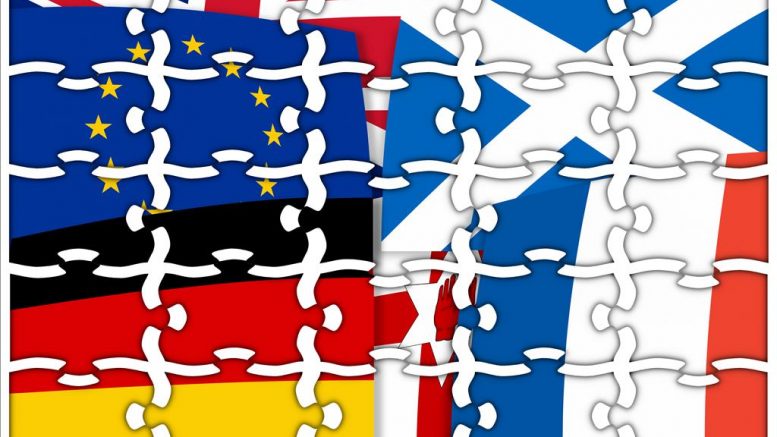Nostalgia and unconvincing economic arguments will not be enough to stop Scotland gravitating back to Europe, writes Murray Ritchie.
Could an independent Scotland fill the United Kingdom’s vacated place in the European Union? After the Scottish National Party’s continuing success in the recent Holyrood elections, the possibility is growing.
Already the public debate is beginning. Independence supporters in Scotland – or at least most of them – support the EU, carry a grudge against Brexit and look to independence to restore their European citizenship.
Those against independence and who accept Brexit say there can be no return to the EU for Scotland because there are too many obstacles. Most daunting would be Scotland’s ability to meet the EU’s economic conditions. This assumption, however, does not seem as safe as it did before the Covid pandemic.
All countries have seen their economics floored in the rush for emergency borrowing to tackle the disaster. It’s a fair bet that many if not all of the EU’s member states could not afford EU membership if they had to re-apply at present.
Those who reject Scotland’s case have familiar arguments quite apart from the economics. Spain could be one problem. The Madrid government detests calls in its devolved administrations for independence. The merciless punishment meted out to Catalan politicians who campaigned for independence signalled its unwavering opposition to the break-up of the nation state – and it does not wish Scotland setting a precedent.
Not so long ago some Spanish politicians were letting it be known that Madrid would veto a Scottish application for EU membership. But they were in opposition. The Spanish government stepped in to make plain it would not interfere in the internal affairs of Scotland or the UK and would not block Scottish membership.
While that looks like one obstacle removed already there are others, including the question of the Borders with England and Northern Ireland. No-one knows how that could be resolved. Northern Ireland’s border in the Irish Sea is widely held as a Brexit disaster not to be repeated. Much political good will would be required between Gretna and Carlisle and of that there is no sign.
And what of currency? The SNP are working hard to avoid a repeat of the 2014 referendum campaign when the Conservative Chancellor, George Osborne, effectively vetoed the plan to share the pound. But, for the moment, so-called sterlingisation is the preference until a new Scottish currency is introduced.
Brussels would require an independent Scotland to commit to joining the Euro eventually but there is no time limit for putting off the decision. Joining the Euro is the least of Scotland’s worries.
Much more pressing is Scotland’s deficit. As of now it is around £40 billion, or eight times the limit set under the Maastricht criteria for EU membership. Most of this is down to the pandemic. But since all EU member states are wrestling with pandemic-induced deficit problems Scotland is seen as no exception. Borrowing is at crazy levels across the EU which is showing its rules to be remarkably elastic in these exceptional times.
Figures for an independent Scotland would be entirely different when, for example, whisky taxes are returned to Scotland along with oil revenues. There could be savings worth billions on Scotland’s share of spending on nuclear weapons, which an independent Scotland would reject, and a different tax regime.
Britain’s Institute for Fiscal Studies notes the alarming gap between Scottish expenditure and revenue last year, but predicts that the EU would consider temporary derogations to oil the wheels of accession for all countries wishing to join the club. This could especially benefit an independent Scotland given the sympathy which exists across the EU for a resumption of Scottish membership amid the lingering distaste in Brussels for Brexit and sympathy for Scotland’s opposition to it.
So much depends on how the EU regards Scotland’s finances and how much politics can finesse economics. In Brussels there are those with memories seared by the experience of Greece when it joined the Euro against all common economic sense. The politicians got it wrong then with their determination to include the Greeks in the single currency with grievous consequences. No-one wants the Scots to suffer in the same way.
Which means that Scotland has a job on its hands promoting its true economic potential at a time of declining oil revenues and spiralling deficit. There is no shortage of naysayers in the debate about Scotland’s ability to thrive as an independent state. Beyond all question the argument against Scottish independence will be about affordability.
Pro-Union UK Conservatives claim bluntly that Scotland hasn’t a hope of meeting EU economic conditions. Others disagree. Anthony Salamone who runs European Merchants, a political analysis firm, has said too much importance is being placed on EU deficit rules which are now in suspension because of Covid. He predicts that the EU will not be too rigid about budget targets in the coming years particularly while Germany and others have exceeded them.
“The budget deficit is part of the Stability and Growth Pact, which is part of all the rules. So, it’s not unimportant but it’s certainly not the thing on which the question of whether or not Scotland can rejoin the EU hinges,” he said. “If your budget deficit is too high it’s not as if the gates come crashing down and your EU membership is over, which is how it’s regularly presented in the UK.”
How can anyone assess accurately the economic potential of an independent Scotland? So far, we have only statistics showing the economics of Scottish devolution inside the UK. Figures for an independent Scotland would be entirely different when, for example, whisky taxes are returned to Scotland along with oil revenues. There could be savings worth billions on Scotland’s share of spending on nuclear weapons, which an independent Scotland would reject, and a different tax regime.
Nicola Sturgeon, Scotland’s newly re-elected first minister, brushes off worries about economics, pointing out that an independent Scotland would deal with economic pressures by borrowing just like any other state – a power which Scotland currently does not enjoy.
Beyond all question the argument against Scottish independence will be about affordability.
Yet there is much more to Scotland’s independence aspirations than money. A familiar argument is resurfacing. Why should Scotland, alone among the nations of the world, be incapable of governing itself when it enjoys other advantages – abundant natural resources, a thriving service sector and an exciting potential for the new green energy?
Even Britain’s Tory politicians, including David Cameron, the former prime minister who agreed to the 2014 referendum, concede that Scotland is perfectly capable of making independence succeed. They just don’t want the Union broken after more than three centuries of rule from London because they fear it would diminish England.
England has much sentiment for the Union. But it will take more than nostalgia and unconvincing economic arguments to stop Scotland gravitating back to the future and Europe.

Headline Photo Credit: Wetzkaz Graphics/Shutterstock.com




